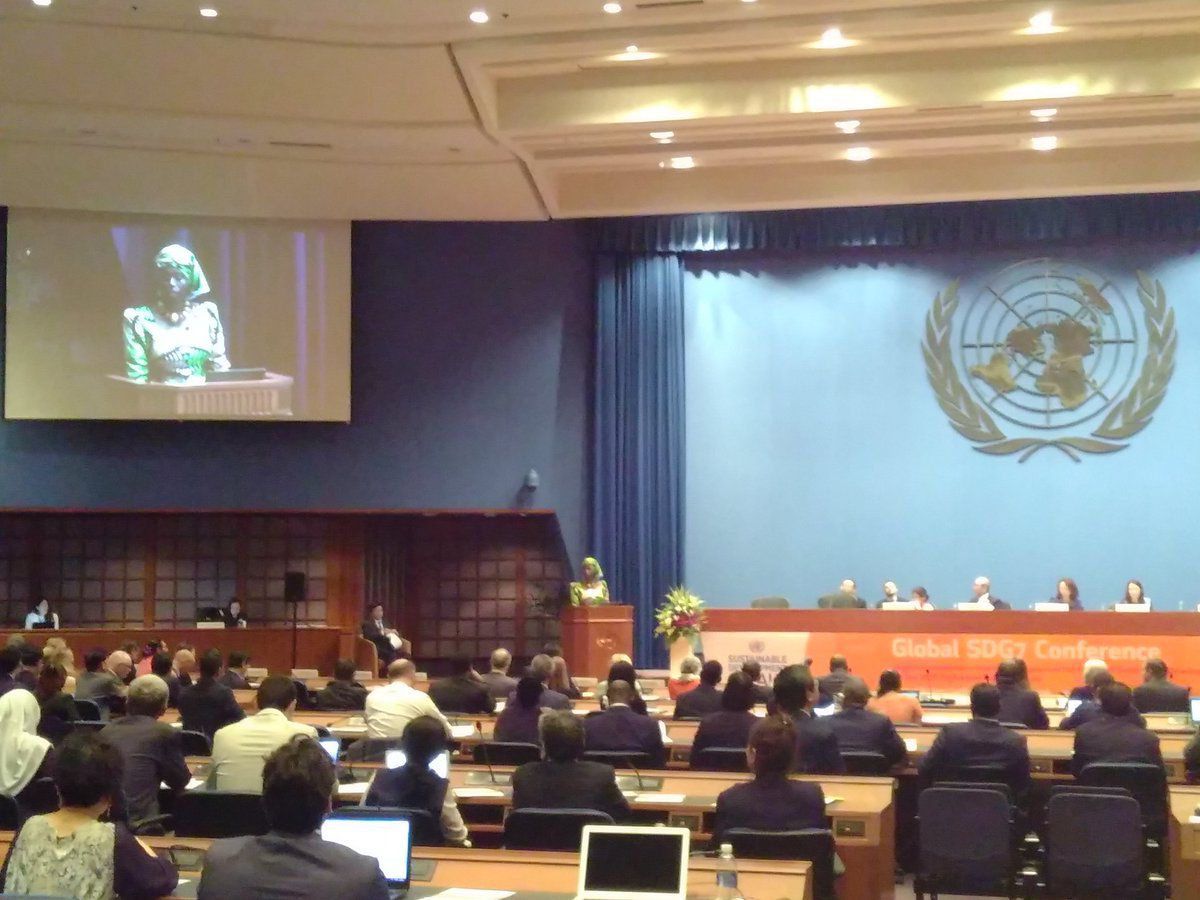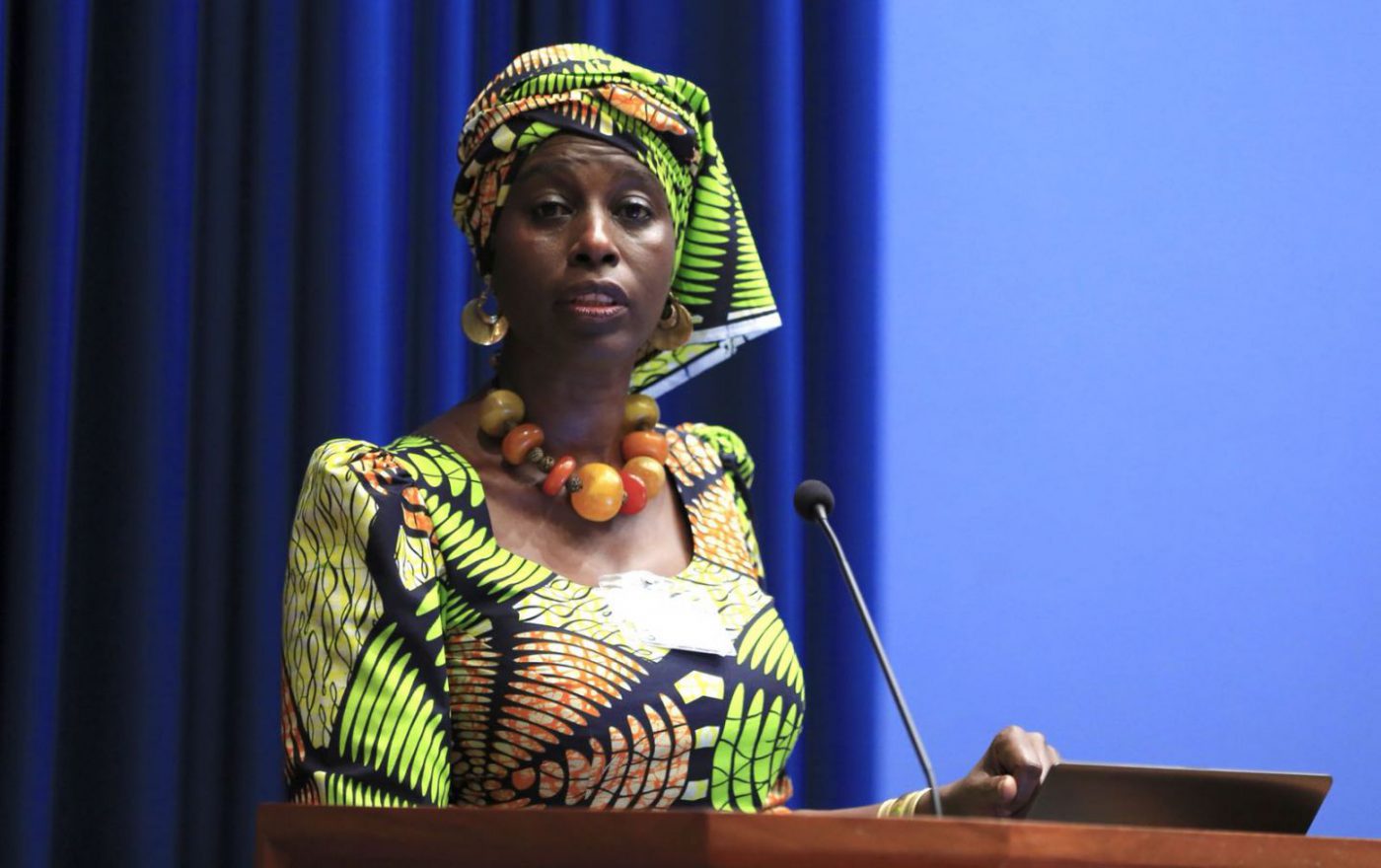In Bangkok, the SDG7 conference is well underway and ends tomorrow on 23 February. The conference on SDG7 is a global preparatory meeting in support of the review of SDG7 at the 2018 UN High-level Political Forum. ENERGIA’s Sheila Oparaocha addressed the audience at the opening plenary session on the second day of the conference. She spoke about energy access and the important role of women in extending sustainable modern energy across the globe.
Here are some of the main points from her speech, and recommendations going forward:
– In households, women are often the primary energy managers. But sustainable modern energy infrastructure and technology tend to reach women and girls last, even if vital for relieving their disproportionate share of unpaid care and domestic work, and enhancing their economic opportunities. This situation however, obscured by the lack of sex-disaggregated data and gender statistics.
– Despite this, women play powerful roles in extending sustainable modern energy. Yet all elements of energy planning and policy-making need to factor in gender dimensions and actively advance women’s leadership. Women need to be involved from start to finish in the design of modern energy access technologies and programmes. They need to be empowered to become more involved in the provision of energy services. Within the energy industry itself, barriers to women executives, entrepreneurs and employees must fall. And their representation on national and global energy councils and other fora must grow.
– Access to electricity can support women’s economic empowerment by facilitating productive and employment opportunities. Engaging women in energy value chains, as employees and as entrepreneurs helps augment their incomes. And when a woman is given an opportunity to earn an income, it helps in many other areas of her life. As mentioned previously, studies show that women reinvest 90 percent of their income in their families and communities.
– In recent years important progress towards including women in the energy value chain has been made. Woman are steadily going beyond their traditional role as “users” and “beneficiaries,” and becoming a part of the solution in the energy access gap, which the conventional business as usual approaches are unable to solve.
A global movement is underway to create a more inclusive approach to energy access, with women and marginalized people taking centre stage—no longer as victims, but as agents and accelerators of change.
– This is strengthened by several recent international agreements, which provide a framework for gender and energy work, including the Istanbul Programme of Action for 2011-2020 which charts out a path for Least Developed Countries (LDCs), highlighting energy access as a priority area for action, along with gender equality and the empowerment of women; and the 2016 Paris Agreement on climate change, which formally recognizes the intersection of climate change and gender equality, empowerment of women.
– Multilateral agencies such as ESMAP, UNIDO, UN Women and UNEP are early movers in ensuring that their gender programmes produce concrete results in investment and implementation at the country level.
– The “ECOWAS Policy for Gender Mainstreaming in Energy Access,” adopted in June 2017, is a best practice model for regional policy, in which 15 countries in West Africa have committed to address existing gender barriers in expanding energy access.

– When it comes to bridging the energy access gap at the last mile, women and their organizations are uniquely positioned to play a critical role. A large number of women are engaged in small and medium-sized enterprises; female ownership represents 30 to 37 percent of all SMEs. This provides a ready springboard for selling energy products and services, leveraging their networks to promote adoption of new technologies. They are effective spokespeople for use of clean energy, endorsing marketing messages and taking advantage of women-to-women communication strategies.
– Because women are close to their customers and know local circumstances, women entrepreneurs have enormous potential to manage supply chain and acquire new creditworthy customers in rural areas, lowering the customer acquisition costs. ENERGIA’s Women’s Economic Empowerment programme works closely with women energy entrepreneurs in hard-to-reach areas across Indonesia, Kenya, Nepal, Nigeria, Senegal, Tanzania and Uganda. The “last-mile” distribution model, centered around women-led micro- and small-scale businesses, has led to a robust programme with more than 4,000 women entrepreneurs involved in selling and distributing clean energy products that has reached 2,6 million consumers.
– A number of partnerships and networks are also emerging, such as the SEforALL’s People Centred Accelerator, wPower, the Global Alliance for Clean Cookstoves, the Clean Energy, Education and Empowerment Initiative, and the Global Women’s Network for the Energy Transition (GWNET) to name but a few.
Recommendations
While there is considerable momentum on the gender and energy nexus globally and new innovative women-centric business models are emerging, potential gains are not being fully realised due to persistent gender barriers and gaps, such as funding barriers, women’s representation in energy sector, discriminatory social norms and practices and data availability. An enabling environment for women in the energy sector at all levels has to be created.
To achieve SDG 7, governments, investors, CSOs, energy and development practitioners are therefore called on to:
- To build gender-responsive global and national energy sector policy regimes through evidence-based policy advocacy
- To promote and invest in decentralized sustainable energy technologies that support gender equality and women’s economic empowerment
- To scale up women’s energy entrepreneurship approach as an effective business model, including to reach last-mile communities
- To prioritise clean cooking fuels and technologies
- To engender energy sector programming through supporting national and locally led initiatives
- And to include systematic and sex-disaggregated data collection and analysis of gender statistics as part of programming and to support policy formulation











Follow us on: